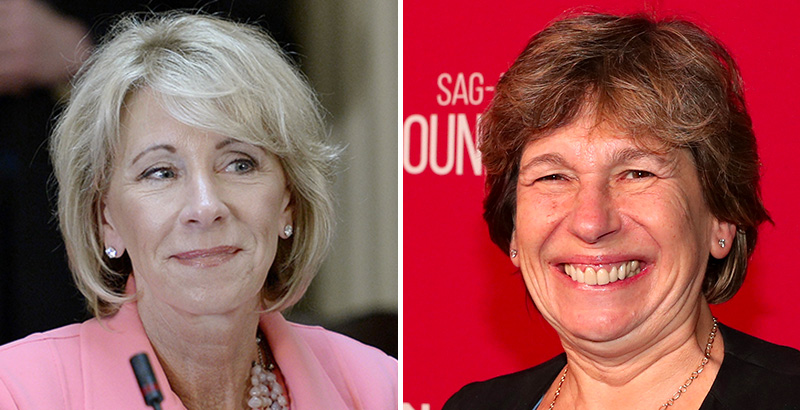Manno: Return of the Jedi — Progressive K-12 Reformers Strike Back in Defense of Charter Schools

For over 25 years, center-left and center-right policymakers and advocates in Washington, D.C., and in many states and communities have worked together to create and grow charter schools that are improving the life outcomes of students, especially those from low-income and minority families.
That remarkable bipartisan alliance — a rarity in Washington today — was threatened in 2017 by wide-ranging criticisms rightly aimed at the new administration on a variety of K-12 reform issues by many thoughtful, progressive, center-left reformers.
The good news is that this fragile coalition seems once again to be on firm ground, though the partnership remains precarious.
The criticisms began with the nomination of Betsy DeVos as secretary of education, focusing largely on how her home state of Michigan epitomized charter schools gone awry. Pundits and reporters jumped to conclusions, as in the New York Times story “Michigan Gambled on Charter Schools: Its Children Lost.” No doubt some criticisms by those on the center-left were well placed, especially regarding how charter schools are authorized in Michigan, and not surprisingly were shared by some on the center-right.
Another criticism — again, not without merit — had to do with the Trump administration’s proposal to cut $9.2 billion, or 13.5 percent, for K-12 education from the Department of Education budget. At the same time, charter school programs would get $500 million in funding, up from $342 million. Again, some on the center-right were as loud in their opposition as those on the center-left.
Amid all this, everyone seemed to have lost track of four unarguable facts.
- The charter movement was inaugurated by Democratic Farm Labor progressives in Minnesota almost 26 years ago.
- Bipartisan coalitions of policymakers and practitioners in states across the country have fueled the growth of these new, independent, and innovative public schools since their origin in Minnesota.
- All Democratic and Republican administrations in Washington beginning with Bill (and Hillary) Clinton have supported the effort to create charter schools.
- The best charters consistently make greater achievement gains than other public schools in the key progressive stronghold of urban areas with minority students, showing what economist Susan Dynarski calls “a consistent pattern” of improvement “[with] students [who] are overwhelmingly low-achieving, poor and nonwhite.”
But in late 2017, the center-left seemed to rediscover its strong and vital voice in support of charters when a new set of criticisms landed from the left focusing on issues related to race, including segregation.
In stunning remarks, American Federation of Teachers President Randi Weingarten called charters “only slightly more polite cousins of segregation.” A report from the UCLA Civil Rights Project and a new policy from the National Education Association also advanced this notion.
This turn in attacks on charters rattled progressive K-12 reformers. A narrative about school quality in Michigan or budget cutbacks in Washington was an easy target, but the contention that charters promoted segregation proved a bridge too far. It galvanized a renewed kind of progressive resistance, in defense of charters.
So, as anti-charter activists overplayed their hand, the K-12 reformer Jedi began their awakening and return.
The progressive Center for American Progress issued a position paper making “The Progressive Case for Charter Schools.” It asserted, “High-quality charter schools have made significant strides toward racial and economic justice,” rooting them in “fundamental progressive values.”
Other defenders followed in rapid succession after being riled by an Associated Press analysis calling charter schools “among the nation’s most segregated.” Here is what three prominent African-American K-12 progressive reformers had to say about the AP story:
- Shavar Jeffries, president of Democrats for Education Reform, criticized the analysis on two fronts. First, he said the methodology “makes apples-to-oranges comparisons that contrast the demographics of individual charter schools to those of entire cities.” Second, he questioned the implicit assumption about the role that white students play in the education of black students: “We take issue with the assumption that black and brown children can’t learn unless they attend school alongside white children. [Charters are] … providing students a high-quality public school option…. Parents need more, not fewer, of those kinds of choices.”
- Amy Wilkins, senior vice president at the National Alliance for Public Charter Schools, was direct: “To the people trying to fabricate a segregation story to deny black students educational opportunity, I have a simple message: Don’t you dare.”
- Chris Stewart, education activist and CEO of the Wayfinder Foundation, asked: “What message are we sending to black children when we tell them only integration will save them?”
And there was icing on the cake.
Jonathan Chait of New York magazine, a longtime center-left follower of charter schools, put the discussion in context, focusing on how segregation is now “the primary talking point for charter critics … [and] an argument for leaving urban children in poor-performing segregated neighborhood public schools instead of high-performing segregated charter schools.” He concluded by asking, “Must we all wait until all those problems have disappeared to give poor urban children a chance?”
So here we are. Perhaps we’ve come full circle, with the Jedi, again resurgent, poised to carry forward the message: Charter schools are based on “fundamental progressive values” and are a key avenue for advancing educational opportunity.
As a policy strategy, chartering is what a growing number of political scientists call transpartisan. It eclipses the usual ideology of both right and left and offers a solution that promotes values aligned with differing, even adversarial, traditional ideologies. It can be a winner for students and communities across time.
Framed in this way, that’s a debate worth having.
Bruno V. Manno is a senior adviser for the Walton Family Foundation’s K-12 program and co-author of Charter Schools at the Crossroads.
Get stories like these delivered straight to your inbox. Sign up for The 74 Newsletter

;)
